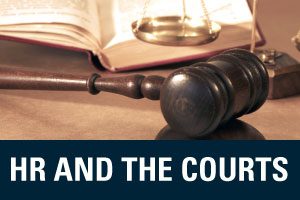HR and the Courts
Each month, CUPA-HR General Counsel Ira Shepard provides an overview of several labor and employment law cases and regulatory actions with implications for the higher ed workplace. Here’s the latest from Ira.
NCAA Loses Appeal For Expedited Ruling Denying Student-Athletes’ Minimum Wage FLSA Claims — Claims Move to Federal Court Trial
The National Collegiate Athletic Association (NCAA) was denied a request or fast track consideration of its appeal of an adverse trial court order to proceed to trial over student-athlete claims that they are covered by the Fair Labor Standards Act minimum wage and overtime rules as they are employees. The trial court judge ruled that the question of whether the student-athletes are employees is a mixed question of law and fact, which should go to trial. The judge concluded that the NCAA can appeal an adverse trial decision after trial.
The NCAA countered that similar suits in the U.S. Appeals Seventh and Ninth Circuits have been dismissed. The NCAA argued that appeals courts in the Seventh Circuit (covering Illinois, Indiana and Wisconsin) and in the Ninth Circuit (covering California, Oregon, Washington, Nevada, Arizona, Idaho and Montana) both held that the NCAA is not the employer of student-athletes. In rejecting the NCAA’s interlocutory appeal, the Third Circuit (covering Pennsylvania, New Jersey and Delaware) ruled that the NCAA failed to meet its burden in showing exceptional circumstances justifying departing from the normal policy of delaying appellate consideration until a final judgement is issued.
EEOC Issues “Guidance” That COVID-19, Under Certain Circumstances, May Be a Disability Covered and Protected By the ADA From Discrimination
The Equal Employment Opportunity Commission (EEOC) issued “guidance” in mid-December stating that, in certain circumstances, COVID-19 may be a disability covered by the Americans With Disabilities Act (ADA), making it illegal for employers to discriminate against employees with COVID-19. The EEOC chair pointed out that employees with disabilities resulting from COVID-19 may be eligible for a reasonable accommodation. Depending on each employee’s individual circumstances, an employee recovering from COVID-19 may meet the ADA’s definition of a disability as a mental or physical impairment that substantially limits a major life activity, or an employer’s perception that the individual has a disability.
Someone who has COVID-19 and experiences multi-day headaches, dizziness and brain fog attributable to COVID-19 is an example of an impairment covered by the ADA. However, the EEOC pointed out that not every person with COVID-19 will qualify as disabled. For example, if someone has COVID-19 and is asymptomatic or has mild symptoms similar to the flu that lasts only a few weeks, with no other consequences, that person would not qualify as disabled. The EEOC suggests an individual assessment of each employee with COVID-19 might be necessary to determine whether it is a disability.
State and Local Ordinances Regulate the Use of Artificial Intelligence/Automated Job Applicant Screening Tools In Screening Job Applicants
New York City (NYC) just established one of the broadest new laws concerning the use of artificial intelligence tools to screen job applicants by NYC employers. The effective date is unclear and local counsel should be consulted on the new regulations in NYC. Under the NYC law, such artificial intelligence tools will be banned in NYC unless they are subject to a “bias audit” conducted a year before the use of the tool. Illinois passed a law similar to the NYC law. Maryland passed a law banning the use of facial recognition in the employment application process without the applicant’s consent. The attorney general in the District of Columbia is also proposing a related proposal addressing “algorithmic discrimination.” The EEOC recently indicated that it would study the use of artificial intelligence job screening tools to see if they contribute to bias in employment decisions.
Denial of Healthcare Coverage For Transgender Surgery Is Subject to Discovery Squabbles As Arizona Appeals Trial Court Order to Turn Over Attorney Opinions Concluded Its Actions Were Legal
The state of Arizona recently appealed a federal trial court’s decision that it turn over “attorney opinions” and that its actions excluding transgender surgery from health plan coverage were legal, to the Ninth Circuit Court of Appeals. The Ninth Circuit covers California, Oregon, Washington, Arizona, Nevada, Idaho and Montana. The health plan’s exclusions are subject to a lawsuit alleging that the denial of benefits violates the applicable sex discrimination statutes.
The state claimed that its actions excluding such benefits form coverage were legal and relied on “attorney opinions” to that effect. The plaintiff in the case asked that the opinions be turned over as part of the litigation, and the state of Arizona refused, claiming the documents were subject to attorney/client privilege The federal trial court judge agreed with the plaintiff, holding that Arizona waived privilege by implication, concluding that privilege cannot be used as both a sword and a shield.
U.S. Department of Labor and NLRB Sign a Memorandum of Understanding, Agreeing to Cooperate In Enforcement Proceedings
The Biden administration’s Department of Labor and National Labor Relations Board (NLRB) have come to an agreement on a memorandum of understanding (MOU) to collaborate on enforcement investigations and share information on potential violations of the law. The enforcement agreement will target independent contractor misclassification matters and retaliation claims brought by workers. On the DOL side, this agreement involves the DOL’s Wage and Hour Division, which enforces the minimum wage and overtime provisions of the Fair Labor Standards Act.
The MOU partners two agencies with similar goals. It appears to follow through on last year’s tri-agency discussion between the DOL, NLRB and the EEOC when the agencies sought to discuss cooperation on retaliation claims brought by employees.



